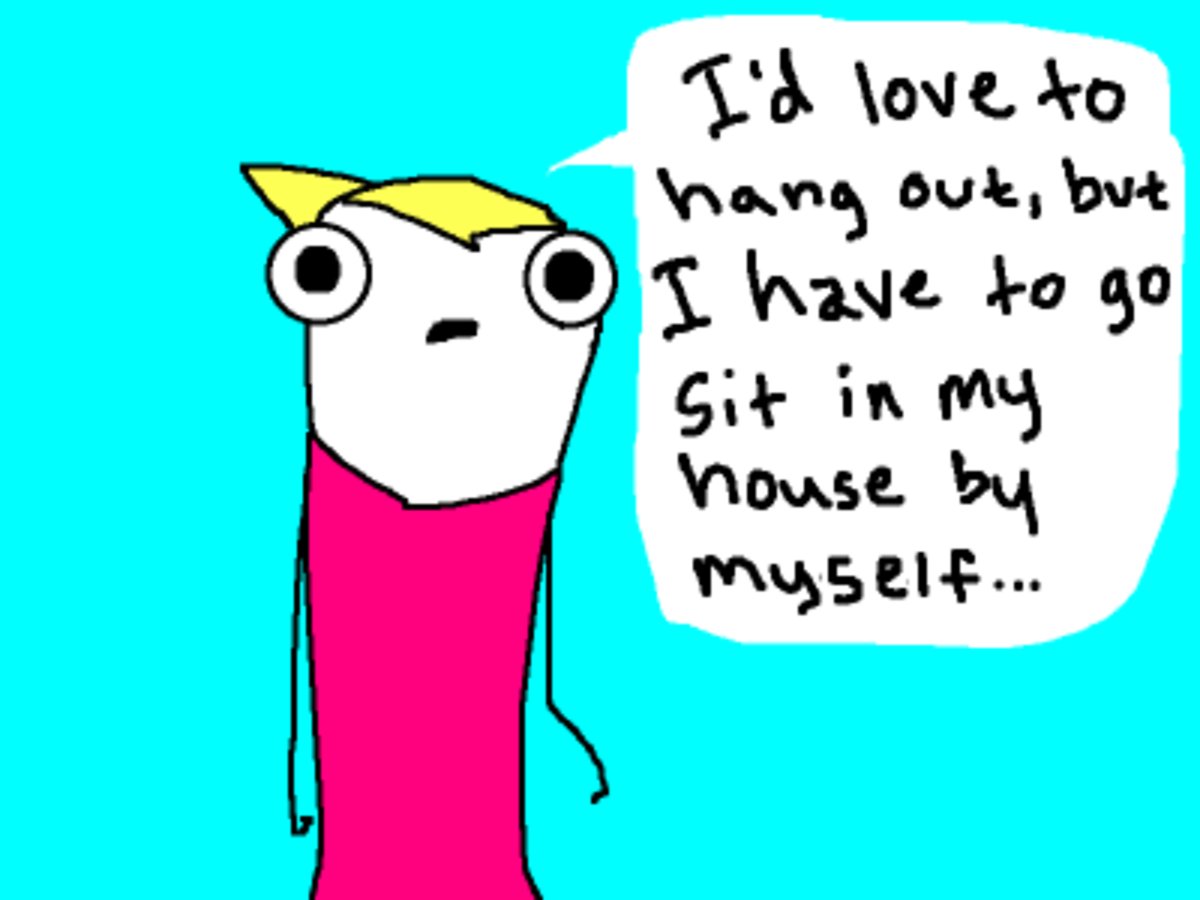Extraverts and Introverts: How Your Myers-Briggs Preference Affects the Way You Interact with People


Extravert and Introvert: The Basic Difference
Extraversion and Introversion, as defined by the Myers-Briggs Type Indicator (MBTI), refer to your preference in the way you interact with people, and identify the source of your energy. The bottom-line definition, according to Carl Jung (on whose work the MBTI is based), is that an Extravert's energy level goes up through interaction with people, and an Introvert's energy level goes down. Though no one is completely Extraverted or Introverted--we all share both attitudes--nearly everyone prefers one over the other to a greater or lesser degree. Think of it as a sliding scale on which any preference strength, from one end through the middle to the other end, falls within the normal range of human behavior.
Because an Extravert's energy comes from the outer world of action and events, he will seek out the company of others more than an Introvert will. The outer world is his preferred sphere of life, and his wide range of activities results in his meeting many people. The Extravert is perceived as sociable and gregarious, and he tends to have a wide circle of acquaintances, all of whom he thinks of as friends. He gives and receives friendship readily, and has fewer boundaries than the Introvert; he will tell new acquaintances things about himself that an Introvert will reveal only to a few deeply trusted friends, if at all. Lyndon Baines Johnson, the highly Extraverted 36th President of the United States, used to pull up his shirt to show new acquaintances his appendix scar, which no Introvert would ever do.
The Introvert's energy comes from the inner world of concepts and ideas, and since interaction with people drains his energy, he will seek them out to a lesser degree than the Extravert does. The inner world is his preferred sphere of life, and he consequently has a narrower range of outer activities. He defends himself against the demands of the outer world by confining his interactions to his family and those few friends who share his interests. The Introvert is perceived as reserved, private, and territorial--whoever invented the concept of "personal space" had to be an Introvert. He doesn't give or accept friendship lightly, and only a special few know his true heart.


At Work
Extraverts prefer a workplace where everyone can see everyone else. If the office is divided into cubicles, Extraverts want the walls to be low. They greet everyone every day, and are always willing to stop whatever they're doing to talk to anyone who comes by. Extraverts dislike meetings less than Introverts do, since any gathering of people enables them to talk about whatever's on their minds. They love brainstorming, and a group of Extraverts gathered for an idea-generating session will get louder and louder as their energy levels rise from all that interaction.
Introverts prefer a quiet workplace in which they have individual cubicles with nice, high walls so no one can see them. If they're working instead in an open area, they will quietly create more private workspaces for themselves by moving bookcases to create partitions, and stack plants, file folders, etc. on top of the bookcases to block the sight of their co-workers. Since their energy level comes from the inner world of concepts and ideas, Introverts can work happily undisturbed all day, and tend to regard interaction as an interruption. Introverts regard meetings as a noisy waste of time, and will sit silently unless required to speak. Indeed, many Introverts would be happy if their co-workers would hold the meeting without them, and just send them a memo afterward relating any decisions that were made. A meeting attended only by Introverts will be short and conducted quietly.
Extraverts think aloud: as soon as their brains click into gear, so do their mouths. It's helpful for Introverts to understand that if you ask an Extravert a question, his immediate response is not necessarily his answer; it's his first reaction to the question. If allowed, he'll talk his way through his thought process, and eventually arrive at his actual answer. For example, if you approach an Extraverted technical editor to tell him that you want to add 1,000 graphics to the report you're drafting, and ask what the impact on time and labor will be, you're likely to get a response like, "Wow, a thousand graphics? That's a lot! Is that what you were working on yesterday? Is Jerry helping you with them? How is Jerry, anyway--I haven't talked to him in a while. What format will the graphics be in? PowerPoint? Excel? Something else? Oh, is that the new program you're writing? How's that coming along? Did you get the funding you needed for it? Have you tried printing the graphics out yet? How do they look? Will they be editable? You know I don't like graphics I can't edit. Remember the ones we got from Frank's office? They were useless; I had to send them back and make those guys completely redo them. Will your program put captions on them? That would really be helpful. And what about frames? Frames would be a really good idea. Oh, you have to get back? Well, why don't I come downstairs with you and we can talk about it some more." Trying to rush an Extravert only annoys him; it's better to let the flow proceed without interruption.
Introverts think silently; they speak when they've arrived at a conclusion. It's helpful for Extraverts to understand that when they ask a question of an Introvert, the ensuing silence does not mean the Introvert doesn't know the answer, or that he's suddenly had a stroke and been rendered speechless. He's just thinking, and he needs peace and quiet in which to do it. Many Introverts feel they can't think if someone's looking at them--too much pressure. When you ask them the same question about the impact in time and resources of adding 1,000 new graphics to your report, they're likely to respond with something like "It's too late," or "There's no money." This is baffling and frustrating to the Extravert, who will sometimes accuse the Introvert of "withholding." This is in turn baffling and frustrating to the Introvert, who can't understand why the Extravert wants to know what he's thinking. Introverts dislike being interrupted when they speak; they interpret it as a message that the Extravert isn't listening and is trying to take over the conversation. Extraverts see an interruption entirely differently, whether done by them or by someone else: it's participating, it's giving feedback, it's assurance to the speaker that the Extravert is listening and interested in the conversation. Indeed, Extraverts can talk and listen at the same time, which few Introverts can, so a conversation between two Extraverts can consist of both people talking simultaneously, with neither of them taking offense.


At Home
When one Extravert marries another, they usually have an active social life since they both gain energy from interacting with other people. Their home tends to be a gathering place, with friends coming and going and several activities going on at once. Extraverts love to see new places, so their vacations consist of travel, new experiences, and lots of new friends.
When two Introverts marry, their home becomes their refuge from the demands of the outer world, a place of peace and quiet. Content with each other's company, they will do far less socializing than an Extraverted couple, regarding interaction as another drain on their energy. An Introverted couple may go all day with little or no conversation, pursuing solitary activities but with a strong sense of being together. Vacations may consist entirely of staying at home, but if they do travel, it will be to quiet, peaceful locations where they will have little interaction with others.
Sounds good for each type, doesn't it? However, since it's true that opposites attract, Introverts and Extraverts frequently end up marrying each other instead of their own type. The Introvert is attracted to the outgoing, gregarious, friendly Extravert, and the Extravert is attracted to the reserve and inner strength of the Introvert. In marriage, the Extravert often becomes the Introvert's window on the world, making the social contacts and experiencing the activities and events in which the Introvert has no interest. The couple usually compromises on social activities, going out more than the Introvert otherwise would, and less than the Extravert would like.
Communication problems often occur, with the Extravert talking at length about whatever is on his or her mind, and the Introvert tuning in only every three to four minutes to find out if he or she is being tasked to do something. Inevitably the Introvert will miss the 30 seconds during which something crucial is being said, and later will suffer the Extravert's rebuke because something important wasn't done. "But I told you--you were sitting right here when we discussed it!" the Extravert will say in exasperation. "But you talk all the time, and I don't always hear you when you tell me to do something," the Introvert may respond, a reply not likely to improve the situation.
Extraverts and Introverts handle anger differently, as well. The Extravert tends to flare up quickly, exclaim or even shout about whatever the problem is, and then it's over, with no residual anger. The Introvert often says nothing when he or she becomes annoyed, so the unexpressed anger tends to build over the hours or days as a problem remains unresolved. In addition, the Introvert often believes that the Extravert knows what he or she is upset about, and resentment increases with the perception that the Extravert is deliberately provoking the problem or failing to address it. This is usually untrue--the Extravert knows the Introvert is brooding about something, and will try to find out what's wrong, which the Introvert perceives as a pretense of innocence. Finally the Introvert will erupt, and the repressed emotion results in a longer and angrier argument than is usually had when it's the Extravert who is angry.


Parents and Children
Decades of rigorous testing and observation indicate that our MBTI preferences are inborn, but not inherited, and this makes for some wild combinations within families.
Two Introverted parents can produce a very Extraverted child, who will follow them around talking endlessly and drain their energy right down to their toes. An Introverted couple I know sent their Extraverted son off to camp for two weeks. When they picked him up, he talked enthusiastically about how great it was and how many friends he made. That evening, though, he became uncharacteristically quiet, and they asked him if something was wrong. "Well," he replied, "I sort of thought you'd have a party to welcome me home."
Two Extraverted parents can in turn produce an Introverted child, who will flee to her bedroom through much of her childhood to get some peace and quiet, leaving her parents to ask each other, "What is she doing up there?" The Introverted child will be entertaining herself and regaining her energy through a variety of solitary pursuits: reading, writing, computer games, drawing, painting, quilting, etc., and will be surprised to realize how many hours can slip by unnoticed.
Communicating More Effectively
Extraverts and Introverts can solve many of their communication problems by remembering their opposite's preference and changing their approach accordingly. Introverts should remember to be patient while the Extravert talks his way through the thought process, and not to hold him to his "first response," which is unlikely to be his final answer. In addition, Introverts must remember that a conversation held in their heads does not equate to actually having that conversation with another person. Extraverts should remember that Introverts need time alone to think, and that the sight of an Introvert alone does not mean he wants the Extravert to come in and start a conversation.

Remember Our Differences
Remembering our differences can improve our communication skills, our relationships, and our effectiveness at work, not to mention reducing our frustration and misunderstandings in all areas of our lives. Try it and see!








